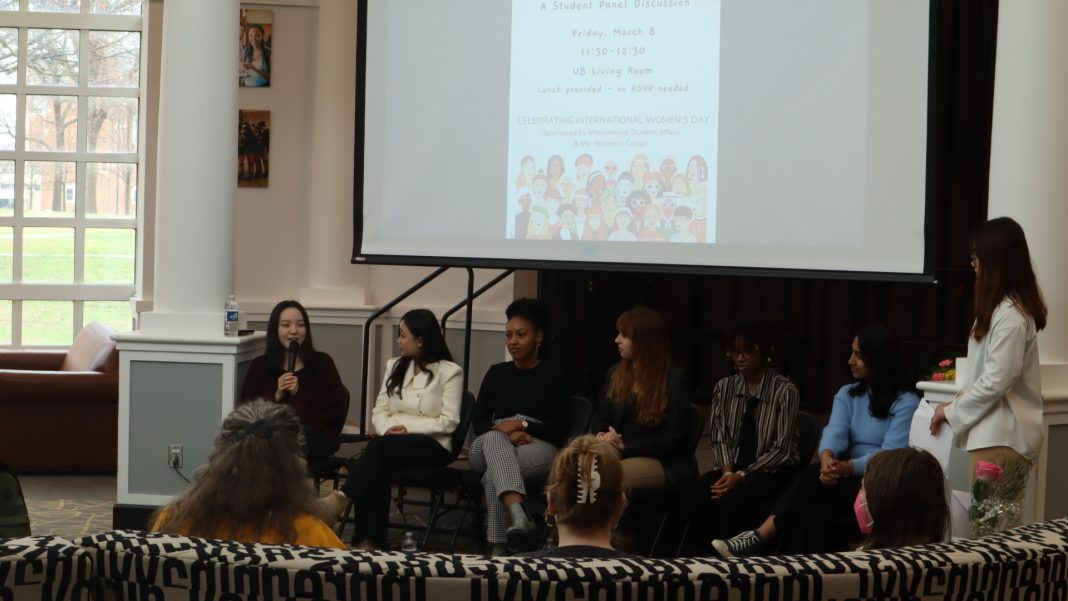The student panel discussion titled “Growing Up in a Gendered World & Navigating a Gendered Campus” was held on March 8 to celebrate International Women’s Day. Sponsored by International Student Affairs and the Women’s Center, the panel features six women-identifying students on campus who discussed the impact of gender on their lives and problems facing women worldwide. The panelists were Maheen Mirza ‘26, Khanh Nguyen ‘24, Membathisi Mtsi ‘27, Catarina Zabot Pasini ‘26, Miyu Aoki ‘26, and Jay'la Teasley ‘25. The panel moderator was Vy Nguyen ‘24.
When asked about the first moment they became aware of gender, Teasley pointed to their “tomboy” look growing up and the way it felt intimidating to other people because they did not usually wear traditional girls’ clothing. Pasini added that she learned how interpretations of fact could influence social interactions by observing little girls shying away from playing sports because it was considered too masculine.
Aoki, coming from Japan, recalled being fluent in English from a young age and translating for her parents as she discussed a fond memory of feeling powerful. For Mirza, it was training in karate and being able to protect her body. Yet when she started attending co-ed classes, she realized that her empowerment was not the norm because she was one of the few women who knew how to defend themselves.
When the discussion transitioned to the biggest problems facing women in each panelist’s respective country, Mtsi cited gender-based violence in South Africa, calling it an “epidemic.” Mirza discussed similar violence toward women in Pakistan, explaining that religion is used as a tool to defend those behaviors. Specifically, a woman was accused of blasphemy for wearing a T-shirt with printed Arabic texts and had to apologize, according to Mirza. To put these anecdotes into context, the quarterly crime statistics released by the Minister of Police of South Africa for the first three months of 2022 show at least 10,818 rape cases. In Pakistan, 32% of women, which equals 34,982,400, have faced some form of gender-based violence, according to the United Nations Populations Fund.
Aoki, on the other hand, brought up the fact that Japan’s gender gap index is low for a developed country, sharing instances when medical schools rejected female applicants due to reasons not related to their academic abilities. The Statista Research Department finds an average gender gap of 35% in Japan, while the Global Gender Gap Report conducted by the World Economic Forum ranks Japan 125th out of 146 countries benchmarked in 2023. Aoki reflected that Japanese people generally do not view gender as a socially constructed concept.
When asked about the major problems DePauw women face, Pasini discussed the way sexual assault is not properly addressed on campus, especially when it happens on Greek life properties. She pointed out that the disrespect for women’s choices and the “loyalty” in Greek houses that motivate members not to call out the predators are reasons why this is the case. Many panel attendees gave her approving nods as Pasini reflected on how she heard first-hand experiences from sexual assault victims and saw the predators walk away without any consequences.
As the discussion came to an end, the panelists shared legacies that they would like to leave and what it means to be a woman. Mtsi wants to be living proof that women can be any person they want to be, as she was able to venture into a foreign land from South Africa and pursue her dreams. Pasini encourages her fellow women to have enough confidence and be willing to learn and contribute to the conversation, even when “we aren’t always encouraged to think our opinions are important.” Teasley emphasizes that although they weren’t a sociable person, they have found their community and hope every woman can find theirs. Aoki considers womanhood to be an aspect in a multitude of identities, not something that can hold her back. Mirza believes that being a woman is being part of the sisterhood, reaching out to and serving as a safe spot for other women. For Nguyen, womanhood is to love and be loved.



